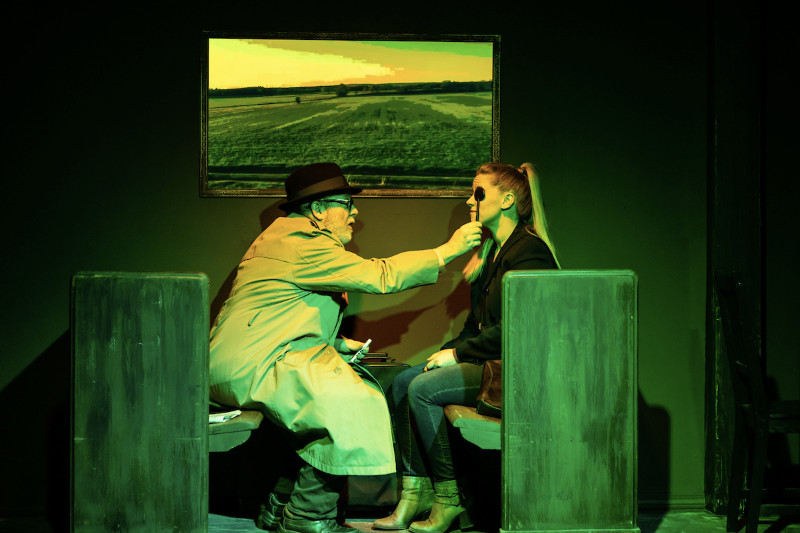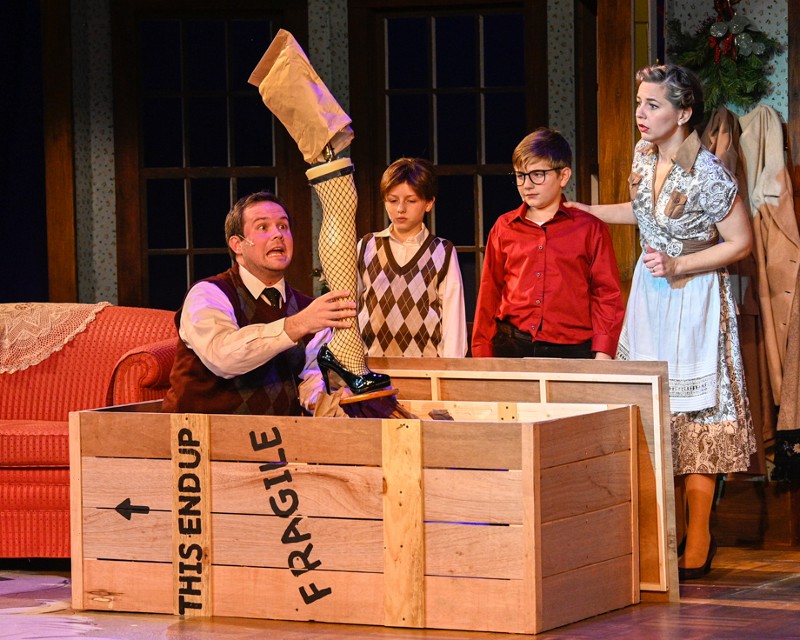Searching for the Right Words: Julia Cho's award-winning "The Language Archive" makes its Michigan debut at Theatre Nova

When Julia Cho read about dying languages, she wondered if losing a language meant something larger—losing a whole way of looking at the world.
In her whimsical play The Language Archive, Cho explores the questions: Do languages that develop between people in a country (or a marriage) die when the participants die? Does the culture die when the language does?
First produced in 2009 at The South Coast Repertory Theater in Costa Mesa, California, and then in 2010 at the Roundabout Theatre Company in New York City, The Language Archive makes its Michigan debut at Ann Arbor's Theatre Nova, February 3-26, directed by Carla Milarch. (The play won the 2010 Susan Smith Blackburn Prize, awarded to a new English-language play by a woman.)
“There are sixty-nine hundred languages in the world. More than half are expected to die within the next century,” says George, a linguist and the play’s protagonist. In addition to his native English, George speaks eight languages including Greek, Cantonese, Esperanto, and Elloway—the last of which is a dying fictional tongue.
"Are we not drawn onward to new erA" Encourages Understanding the Climate Crisis From an Unconventional Perspective

A few people quietly left the UMS presentation of Are we not drawn onward to new erA mid-performance while many others stayed and took part in a spirited standing ovation.
Conceived and performed by Belgian theater collective Ontroerend Goed, it’s just one of those shows: an experimental, challenging piece of theatrical performance art that you either embrace or reject.
And your reaction likely depended on your capacity for patience and ambiguity, which was initially tested when deciding whether or not to purchase a ticket for the January 20 or January 21 performance.
By way of a vague show description, the UMS site reads, “You can’t put toothpaste back in the tube. You can’t remake a shattered vase. Or undo the damage that humans have inflicted on the Earth. But what if you could—in just one night?” (When asking my husband if he wanted to accompany me to the show, he asked, “What is it about?” “Uh … repair, I guess?” He didn’t come.)
Selina Thompson's “salt: dispersed” is a powerful document of her monologue retracing the transatlantic slave route forced on her ancestors

In 2016, Selina Thompson, an interdisciplinary artist based in Birmingham, England, went on a journey to retrace the path of her ancestors. That path was that of the transatlantic slave trade.
The writer and performer recounts her trip in salt, a monologue she first performed in 2017, and now in salt: dispersed, the film adaptation of her stage presentation. UMS is streaming the film for free through February 13 as part of its Renegade Festival's No Safety Net series, which focuses on theater and art installations.
Thompson's mission started in the U.K., boarding a cargo ship with another Black female artist, and discovering a story so powerful it takes the air out of your lungs.
Ann Arbor Civic Theatre's take on "The Curious Incident of the Dog in the Night-Time" is a mystery that explores a spectrum of emotions and relationships

Cassie Mann was a fan of Mark Haddon’s best-selling novel The Curious Incident of the Dog in the Night-Time and was excited when Simon Stephens' stage version became a hit in London and New York.
“I went to New York and saw the Broadway version and just loved it,” she said. “It’s got so many elements to it. It’s a family drama, it’s got humor, it’s a mystery, it’s got themes of perseverance and it’s a good character-driven play and yet it’s got a love of fun stuff that goes along with it.”
Mann wanted to direct a production for the Ann Arbor Civic Theatre and was all set to stage it in 2021, when the show was canceled because of the pandemic. This pause gave Mann a chance to delve a little deeper into the play and its unusual perspective.
The Curious Incident of the Dog in the Night-Time begins as a mystery. Fifteen-year-old Christopher Boone discovers the corpse of a neighbor’s dog and sets out to discover who murdered the dog. Though never explicitly remarked on in Haddon’s novel or Stephens’ play, Christopher is on the autistic spectrum. The story of this mystery and what comes after is told from Christopher’s perspective as a sort of therapy suggested by his teacher, Siobhan.
The play is a family drama revolving around Christopher’s troubled relations with his parents. But it’s also a celebration of his determination, his wit, and his mathematical genius.
Mann read some books on autism and one book in particular influenced her approach to the play.
AADL 2022 Staff Picks: Homepage

Don't ever write a year-in-review intro before you've had lunch. See below for reasons:
2022 is Pulp’s sixth year of compiling a delectable list of Ann Arbor District Library staff picks, featuring a smorgasbord of media to review and devour. With an insatiable hunger for books, films, TV shows, podcasts, music, and more, our AADL staffer suggestions will whet your appetite for anything you may have missed in 2022—or from previous years.
Because who can keep current with everything on the media menu these days?
The current media landscape is a 24-hour grocery store with everything everywhere available all at once. It’s decision paralysis at the deli counter, so consider us your Instacart shoppers for things to read, watch, play, listen to, and experience. (Apologies if we missed anything on your shopping list, and we hope our substituting a banana for that frozen pizza is OK.)
With more than 36,000 words to ingest in the 2022 Staff Picks, we’ve divided everything into four separate courses so you can enjoy each portion at your leisure:
➥ AADL 2022 Staff Picks: Words
➥ AADL 2022 Staff Picks: Screens
➥ AADL 2022 Staff Picks: Audio
➥ AADL 2022 Staff Picks: Pulp Life
If you feel inspired as you eat up our words, let us know in the comments sections what you sank your teeth into this year. Your tasty tips can be from 2022 or any other era; it just needs to encompass whatever art, culture, or entertainment you enjoyed over the past year.
Now, open up these posts and chow down.
We’re off to make some spaghetti.
Fraught reunions with old friends are at the core of Penny Seat's "First Snow"

The prospect of seeing friends from high school, after a years-long separation, always feels fraught. Will it be awkward? Will they judge you? Will you judge them? What will you talk about? Will you somehow ruin perfectly contained, long-packed-away memories?
This anxiety’s at the core of Joseph Zettelmaier’s new play, First Snow, now having its world premiere production via The Penny Seats Theatre Company at The Stone Chalet Event Center in Ann Arbor.
Evan (Michael Alan Herman), a Chicago-based photographer, vanished from his small hometown shortly after his high school graduation, when both of his parents died in a car accident. In the 10-year interim, he’s eschewed all contact with his best high school band buddies Lisa (Josie Eli Herman) and Bob (Jonathan Jones).
But music teacher Lisa—with whom Evan was once romantically involved—finally tracks him down to invite him to a holiday party in her home, which she shares with her young daughter, Natalie (Patrice Linman); and because Evan is working on a photo series about holiday celebrations, the invitation dovetails with his work. What Evan doesn’t know, though, is that he and Bob—and Bob’s wide-eyed, former-popular-girl wife Nora (Celah Convis)—are the only ones on this party’s guest list.
Not that this is malevolently ominous. The three friends simply have things they need to say to each other in order to move forward.
A modern Marion takes the lead in U-M’s "The Heart of Robin Hood"

The legend of Robin Hood has been told for centuries. In the usual version, he is a nobleman who has been forced from his estate. He gathers a band of “merry men” who are dedicated to robbing from the rich and giving to the desperately poor.
But in earlier versions of the story, told in verse and song, Robin robbed from the poor but didn’t give to the rich and didn’t have noble aspirations. Playwright David Farr has returned to that earlier version of Robin Hood and to a very different Maid Marion, who challenges the outlaw to be a better man.
The University of Michigan Department of Theatre and Drama will present Farr’s The Heart of Robin Hood at the Power Center for the Arts, December 8-11.
Director Geoff Packard said that Farr takes a decidedly different view of Robin Hood and his Merry Men.
U-M Gilbert and Sullivan Society celebrates its 75th anniversary with pirates, policemen, and paleontologists

With cat-like tread, a rollicking band of pirates will step upon the stage from December 8-11 as they have done about every four years since 1949 when the two-year-old University of Michigan Gilbert and Sullivan Society (UMGASS) gave its first performance of The Pirates of Penzance.
Sparkling tunes and lyrics replete with irony, wit, conflict, and romance make it no surprise that UMGASS would celebrate its 75th anniversary with a production of Gilbert & Sullivan’s two-act comic operetta. Director David Andrews says, “It’s probably the best known and best loved of Gilbert and Sullivan’s pieces.” Andrews says the show doesn’t just have catchy melodies that people hum on the way out: “Some people are humming on the way in,” he says of the well-known show.
Encore Theatre's “A Christmas Story: The Musical" sings the praises of the classic film

A stage musical based on a beloved film classic—like, say, A Christmas Story: The Musical, now being staged at Dexter’s Encore Theatre—can be a double-edged sword.
Yes, it’s a known commodity, so people will often line up to see it without too much coaxing, but the show’s creators must delicately thread the needle of staying true enough to the original material to satisfy fans, while also providing enough surprises and new elements to remake the story in a new medium.
If anything, the musical adaptation of A Christmas Story—with a book by Joseph Robinette, and music and lyrics by University of Michigan alums Benj Pasek and Justin Paul (before they won Tonys for Dear Evan Hansen)—errs slightly on the side of dogged loyalty to the 1983 movie’s script, straining to check every classic-moment box.
Yet the reason Story has so many such boxes is because it is a funny, charmingly rendered, nostalgic slice of American childhood, set in a small Indiana town in 1940.
Drawn from radio stories told by humorist Jean Shepherd in the 1950s, Story focuses on the pre-Christmas trials and tribulations of 9-year-old Ralphie Parker (Gavin Cooney), who desperately wants a Red Ryder BB gun. The problem is, he can’t convince his parents (David Moan and Jessica Grové), his teacher (Alley Ellis), or even a department store Santa (Mitchell Hardy) that if he gets one, he won’t “shoot his eye out.”
But Ralphie keeps scheming while also dealing with bullies, theme papers, and a gruff father who’s chasing his own form of validation.
First, let’s address the baby elephant in the room:
Group Swim: PTD Productions' "The Sweet Delilah Swim Club" makes a splash on the importance of friends

The Sweet Delilah Swim Club celebrates the friendship of five women over time. Artwork courtesy of PTD Productions.
PTD Productions' The Sweet Delilah Swim Club is funny, heartwarming, and shows the beautiful bonds of five women just trying to get through life.
This comedy, written by Jessie Jones, Nicholas Hope, and Jamie Wooten, takes us to North Carolina and introduces us to a group of girlfriends who met swimming for their college swim team. Every year during the same weekend in August, they rent out the same beachside cottage in the Outer Banks and use that time to catch up with one another and have a yearly group swim. Time progresses rapidly in this show, with the first scene taking place 22 years after graduation and the characters in their early 40s. By the end of the show, another 33 years have passed and the ladies are in their 70s.
Marie Jones plays Sheree, the former captain of the team and the group’s Type A organizer. She has a set schedule for each day and gets overwhelmed if the schedule doesn’t go according to plan. Sheree's weird health food disgusts her friends even though they all pretend to like it. Jones’ performance is endearing and honest as she navigates a character learning to give up some control.


































